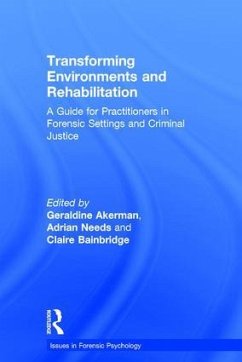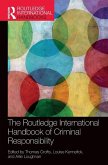Transforming Environments and Rehabilitation
A Guide for Practitioners in Forensic Settings and Criminal Justice
Herausgeber: Akerman, Geraldine; Bainbridge, Claire; Needs, Adrian
Transforming Environments and Rehabilitation
A Guide for Practitioners in Forensic Settings and Criminal Justice
Herausgeber: Akerman, Geraldine; Bainbridge, Claire; Needs, Adrian
- Gebundenes Buch
- Merkliste
- Auf die Merkliste
- Bewerten Bewerten
- Teilen
- Produkt teilen
- Produkterinnerung
- Produkterinnerung
Bringing together leadinging forensic psychologists and drawing on new directions for research, practice and theory, this book explores the inter-relationships between structured programmes and the environment in which these programmes take place.
Andere Kunden interessierten sich auch für
![Sentencing Youth to Life in Prison Sentencing Youth to Life in Prison]() Kathi Milliken-BoydSentencing Youth to Life in Prison165,99 €
Kathi Milliken-BoydSentencing Youth to Life in Prison165,99 €![An Ontology of Organized Crime An Ontology of Organized Crime]() Stephen SchneiderAn Ontology of Organized Crime180,99 €
Stephen SchneiderAn Ontology of Organized Crime180,99 €![Sexual Assault Kits and Reforming the Response to Rape Sexual Assault Kits and Reforming the Response to Rape]() Sexual Assault Kits and Reforming the Response to Rape160,99 €
Sexual Assault Kits and Reforming the Response to Rape160,99 €![The Routledge International Handbook of Criminal Responsibility The Routledge International Handbook of Criminal Responsibility]() The Routledge International Handbook of Criminal Responsibility279,99 €
The Routledge International Handbook of Criminal Responsibility279,99 €![Exploring Vulnerability in the Criminal Justice System in England and Wales Exploring Vulnerability in the Criminal Justice System in England and Wales]() Laura FarrugiaExploring Vulnerability in the Criminal Justice System in England and Wales179,99 €
Laura FarrugiaExploring Vulnerability in the Criminal Justice System in England and Wales179,99 €![The Sexual Murderer The Sexual Murderer]() Eric BeauregardThe Sexual Murderer180,99 €
Eric BeauregardThe Sexual Murderer180,99 €![Culture, Diversity, and Criminal Justice Culture, Diversity, and Criminal Justice]() Culture, Diversity, and Criminal Justice168,99 €
Culture, Diversity, and Criminal Justice168,99 €-
-
-
Bringing together leadinging forensic psychologists and drawing on new directions for research, practice and theory, this book explores the inter-relationships between structured programmes and the environment in which these programmes take place.
Hinweis: Dieser Artikel kann nur an eine deutsche Lieferadresse ausgeliefert werden.
Hinweis: Dieser Artikel kann nur an eine deutsche Lieferadresse ausgeliefert werden.
Produktdetails
- Produktdetails
- Verlag: Taylor & Francis
- Seitenzahl: 394
- Erscheinungstermin: 20. September 2017
- Englisch
- Abmessung: 234mm x 156mm x 24mm
- Gewicht: 757g
- ISBN-13: 9781138959118
- ISBN-10: 1138959111
- Artikelnr.: 69944605
- Herstellerkennzeichnung
- Libri GmbH
- Europaallee 1
- 36244 Bad Hersfeld
- gpsr@libri.de
- Verlag: Taylor & Francis
- Seitenzahl: 394
- Erscheinungstermin: 20. September 2017
- Englisch
- Abmessung: 234mm x 156mm x 24mm
- Gewicht: 757g
- ISBN-13: 9781138959118
- ISBN-10: 1138959111
- Artikelnr.: 69944605
- Herstellerkennzeichnung
- Libri GmbH
- Europaallee 1
- 36244 Bad Hersfeld
- gpsr@libri.de
Geraldine Akerman is a chartered and HCPC registered Forensic Psychologist and Associate Fellow of the British Psychological Society and Europsych. She currently works as a Therapy Manager at HMP Grendon and is a Visiting Lecturer at the University of Birmingham and Cardiff Metropolitan University. Adrian Needs is a Forensic Psychologist by background, qualified as a practitioner with experience including 14 years in HM Prison Service. He runs the MSc Forensic Psychology course at the University of Portsmouth and through the BPS played a prominent role in steering the formulation of national standards for postgraduate training in this field. His current research interests include transition and offending in former members of the armed forces. Claire Bainbridge is a chartered and HCPC registered Forensic Psychologist and Associate Fellow of the British Psychological Society. She has over twenty years' experience of working with offenders in a variety of settings, including prison, health, police and probation services and is currently a Consultant Forensic Psychologist within the Offender Health and Forensic Community Service at Tees, Esk and Wear Valleys NHS Foundation Trust.
Foreword, Rex Haigh, Introduction, Geraldine Akerman, Adrian Needs and
Claire Bainbridge 1. Steps to an ecology of human functioning for forensic
psychology, Alethea Adair-Stantiall and Adrian Needs 2. The social context
of transition and rehabilitation, Adrian Needs and Alethea Adair-Stantiall
3. Only connect: implications of social processes and contexts for
understanding trauma, Adrian Needs 4. Trauma-informed care and 'good lives'
in confinement: acknowledging and offsetting adverse impacts of chronic
trauma and loss of liberty, Lawrence Jones 5. A campaign for climate
change: the role of therapeutic relationships within a climate of control,
Sarah Lewis 6. The importance of personal safety to therapeutic outcome in
the prison setting, Andrew Day and James Vess 7. Rehabilitating offenders:
the enabling environment of forensic therapeutic communities, Michael
Brookes 8. Creating a therapeutic community from scratch: where do we
start? Geraldine Akerman and Patrick Mandikate 9. Psychologically informed
planned environments: a new optimism for criminal justice provision? Nick
Benefield, Kirk Turner, Lucinda Bolger and Claire Bainbridge 10.
Democratisation, disability and defence mechanisms: reality confrontation
in Rampton, Jon Taylor 11. Relationships, social context and personal
change: the role of therapeutic communities, Richard Shuker 12. Wearing two
hats: working therapeutically as a discipline prison officer, Emma Guthrie,
Laura Smillie, Annette McKeown and Claire Bainbridge 13. The Enabling
Environments Award as a transformative process, Sarah Paget and Roland
Woodward 14. Creating an Enabling Environment in high security prison
conditions: an impossible task or the start of a revolution? Alice L.
Bennett and Jenny Tew 15. Establishing Enabling Environment principles with
young adult males in a custodial setting, Rachel O'Rourke, Annie Taylor and
Kevin Leggett 16. The heart and soul of the transforming environment: how a
values-driven ethos sustains a therapeutic community for sexual offenders,
Andrew Frost and Jason Ware 17. The role of environmental factors in
effective gender-responsive programming for women in the United States:
current status and future directions, Dana J. Hubbard and Betsy Matthews
18. Contextual influences in prison-based psychological risk assessment:
problems and solutions, Jo Shingler and Adrian Needs 19. The importance of
organisational factors in transferring the principles of effective
intervention to offender rehabilitation in the real world, Dominic A. S.
Pearson 20. Nidotherapy: a systematic environmental therapy, Peter Tyrer
and Helen Tyrer
Claire Bainbridge 1. Steps to an ecology of human functioning for forensic
psychology, Alethea Adair-Stantiall and Adrian Needs 2. The social context
of transition and rehabilitation, Adrian Needs and Alethea Adair-Stantiall
3. Only connect: implications of social processes and contexts for
understanding trauma, Adrian Needs 4. Trauma-informed care and 'good lives'
in confinement: acknowledging and offsetting adverse impacts of chronic
trauma and loss of liberty, Lawrence Jones 5. A campaign for climate
change: the role of therapeutic relationships within a climate of control,
Sarah Lewis 6. The importance of personal safety to therapeutic outcome in
the prison setting, Andrew Day and James Vess 7. Rehabilitating offenders:
the enabling environment of forensic therapeutic communities, Michael
Brookes 8. Creating a therapeutic community from scratch: where do we
start? Geraldine Akerman and Patrick Mandikate 9. Psychologically informed
planned environments: a new optimism for criminal justice provision? Nick
Benefield, Kirk Turner, Lucinda Bolger and Claire Bainbridge 10.
Democratisation, disability and defence mechanisms: reality confrontation
in Rampton, Jon Taylor 11. Relationships, social context and personal
change: the role of therapeutic communities, Richard Shuker 12. Wearing two
hats: working therapeutically as a discipline prison officer, Emma Guthrie,
Laura Smillie, Annette McKeown and Claire Bainbridge 13. The Enabling
Environments Award as a transformative process, Sarah Paget and Roland
Woodward 14. Creating an Enabling Environment in high security prison
conditions: an impossible task or the start of a revolution? Alice L.
Bennett and Jenny Tew 15. Establishing Enabling Environment principles with
young adult males in a custodial setting, Rachel O'Rourke, Annie Taylor and
Kevin Leggett 16. The heart and soul of the transforming environment: how a
values-driven ethos sustains a therapeutic community for sexual offenders,
Andrew Frost and Jason Ware 17. The role of environmental factors in
effective gender-responsive programming for women in the United States:
current status and future directions, Dana J. Hubbard and Betsy Matthews
18. Contextual influences in prison-based psychological risk assessment:
problems and solutions, Jo Shingler and Adrian Needs 19. The importance of
organisational factors in transferring the principles of effective
intervention to offender rehabilitation in the real world, Dominic A. S.
Pearson 20. Nidotherapy: a systematic environmental therapy, Peter Tyrer
and Helen Tyrer
Foreword, Rex Haigh, Introduction, Geraldine Akerman, Adrian Needs and
Claire Bainbridge 1. Steps to an ecology of human functioning for forensic
psychology, Alethea Adair-Stantiall and Adrian Needs 2. The social context
of transition and rehabilitation, Adrian Needs and Alethea Adair-Stantiall
3. Only connect: implications of social processes and contexts for
understanding trauma, Adrian Needs 4. Trauma-informed care and 'good lives'
in confinement: acknowledging and offsetting adverse impacts of chronic
trauma and loss of liberty, Lawrence Jones 5. A campaign for climate
change: the role of therapeutic relationships within a climate of control,
Sarah Lewis 6. The importance of personal safety to therapeutic outcome in
the prison setting, Andrew Day and James Vess 7. Rehabilitating offenders:
the enabling environment of forensic therapeutic communities, Michael
Brookes 8. Creating a therapeutic community from scratch: where do we
start? Geraldine Akerman and Patrick Mandikate 9. Psychologically informed
planned environments: a new optimism for criminal justice provision? Nick
Benefield, Kirk Turner, Lucinda Bolger and Claire Bainbridge 10.
Democratisation, disability and defence mechanisms: reality confrontation
in Rampton, Jon Taylor 11. Relationships, social context and personal
change: the role of therapeutic communities, Richard Shuker 12. Wearing two
hats: working therapeutically as a discipline prison officer, Emma Guthrie,
Laura Smillie, Annette McKeown and Claire Bainbridge 13. The Enabling
Environments Award as a transformative process, Sarah Paget and Roland
Woodward 14. Creating an Enabling Environment in high security prison
conditions: an impossible task or the start of a revolution? Alice L.
Bennett and Jenny Tew 15. Establishing Enabling Environment principles with
young adult males in a custodial setting, Rachel O'Rourke, Annie Taylor and
Kevin Leggett 16. The heart and soul of the transforming environment: how a
values-driven ethos sustains a therapeutic community for sexual offenders,
Andrew Frost and Jason Ware 17. The role of environmental factors in
effective gender-responsive programming for women in the United States:
current status and future directions, Dana J. Hubbard and Betsy Matthews
18. Contextual influences in prison-based psychological risk assessment:
problems and solutions, Jo Shingler and Adrian Needs 19. The importance of
organisational factors in transferring the principles of effective
intervention to offender rehabilitation in the real world, Dominic A. S.
Pearson 20. Nidotherapy: a systematic environmental therapy, Peter Tyrer
and Helen Tyrer
Claire Bainbridge 1. Steps to an ecology of human functioning for forensic
psychology, Alethea Adair-Stantiall and Adrian Needs 2. The social context
of transition and rehabilitation, Adrian Needs and Alethea Adair-Stantiall
3. Only connect: implications of social processes and contexts for
understanding trauma, Adrian Needs 4. Trauma-informed care and 'good lives'
in confinement: acknowledging and offsetting adverse impacts of chronic
trauma and loss of liberty, Lawrence Jones 5. A campaign for climate
change: the role of therapeutic relationships within a climate of control,
Sarah Lewis 6. The importance of personal safety to therapeutic outcome in
the prison setting, Andrew Day and James Vess 7. Rehabilitating offenders:
the enabling environment of forensic therapeutic communities, Michael
Brookes 8. Creating a therapeutic community from scratch: where do we
start? Geraldine Akerman and Patrick Mandikate 9. Psychologically informed
planned environments: a new optimism for criminal justice provision? Nick
Benefield, Kirk Turner, Lucinda Bolger and Claire Bainbridge 10.
Democratisation, disability and defence mechanisms: reality confrontation
in Rampton, Jon Taylor 11. Relationships, social context and personal
change: the role of therapeutic communities, Richard Shuker 12. Wearing two
hats: working therapeutically as a discipline prison officer, Emma Guthrie,
Laura Smillie, Annette McKeown and Claire Bainbridge 13. The Enabling
Environments Award as a transformative process, Sarah Paget and Roland
Woodward 14. Creating an Enabling Environment in high security prison
conditions: an impossible task or the start of a revolution? Alice L.
Bennett and Jenny Tew 15. Establishing Enabling Environment principles with
young adult males in a custodial setting, Rachel O'Rourke, Annie Taylor and
Kevin Leggett 16. The heart and soul of the transforming environment: how a
values-driven ethos sustains a therapeutic community for sexual offenders,
Andrew Frost and Jason Ware 17. The role of environmental factors in
effective gender-responsive programming for women in the United States:
current status and future directions, Dana J. Hubbard and Betsy Matthews
18. Contextual influences in prison-based psychological risk assessment:
problems and solutions, Jo Shingler and Adrian Needs 19. The importance of
organisational factors in transferring the principles of effective
intervention to offender rehabilitation in the real world, Dominic A. S.
Pearson 20. Nidotherapy: a systematic environmental therapy, Peter Tyrer
and Helen Tyrer









